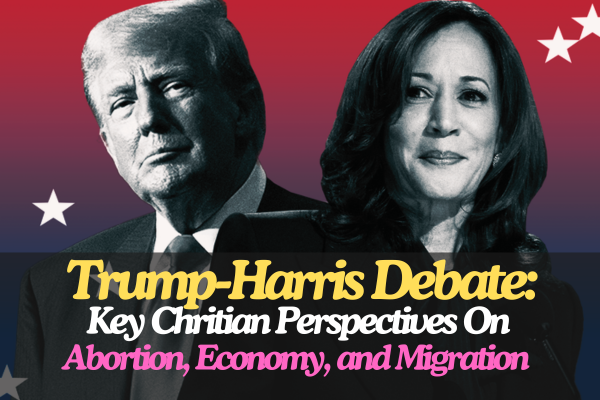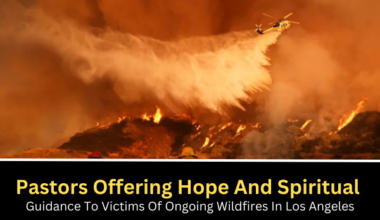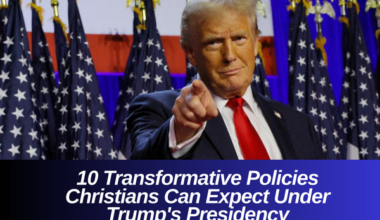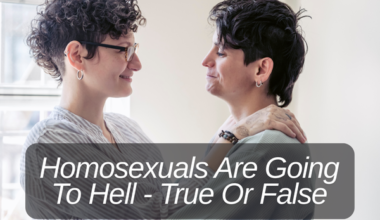Since a few days ago, Christians have typically been divided in their response to the debates between political candidates such as Donald Trump and Kamala Harris, particularly on issues like abortion, the economy, or migration.
Abortion:
Many conservative Christians have long considered opposition to abortion as a chief moral issue, especially among evangelicals and Catholics. Many in this group have historically supported Trump’s strong anti-abortion stance and therefore his policies to restrict abortion access. There will be Christians of all stripes, including more progressive segments in various denominations—who lean at least a little left like Harris on this issue and emphasize social justice writ broadly as it pertains to women.
Economy:
The Christian response to economic policy issues usually falls along the lines of fairness and care for the disadvantaged, as Scripture outlines. Many conservative Christians appreciate Trump for addressing such concerns as economic growth, tax cuts, and deregulation that lead to better personal freedoms and businesses. Although, progressive Christians might say Harris’ thoughts on redistributing wealth and economically-minded acts of radical love are more biblical as they care for the oppressed.
Immigration:
Christians split on the issue of immigration as well. One group, consisting presumably of conservative Christians who consider Trump’s immigration policies, shows a renewed commitment to law and order/national security. Conversely, many who adhere to the more social teachings of compassion and care for refugees find Harris’s views on immigration as a reflection of their Christian beliefs—i.e., he is “of course” going to vote against these policies.”
In general, the responses of Christians and Christian organizations have been splintered depending on theological interpretation, political ideology, or social values.
Trump-Harris Debate: Key Christian Perspectives on Abortion, Economy, and Migration
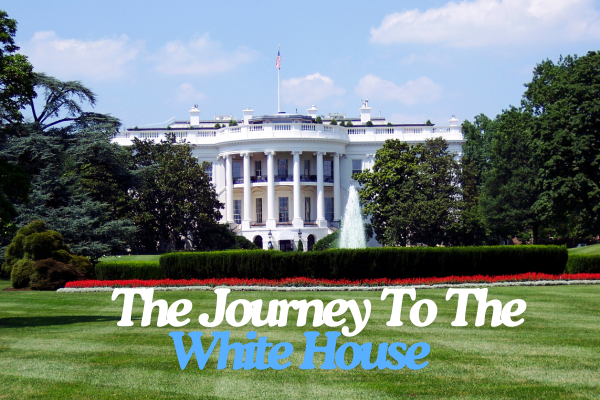
What happened with migration policies?
At the same time, this news catalyzes a debate between figures like Donald Trump and Kamala Harris over proper migration policies where Christian reactions are divided because of differing interpretations mediating biblical philosophical ideals.
1. Trump’s Hard Line On Immigration Polling Well
Traditionalist Evangelicals and Catholics: A significant faction of the conservative Christian wing are linking to Trump over his hardline immigration stances border security wall, and devises query math burdens so they can prioritize unapproved migration control. These urgently see national security and law-and-order it as a direct matter for wanting to preserve its Christian ark; in both reflecting on the end of days.
Biblical Rationalization: A few Christians cite Romans 13 — stressing obedience to governmental authorities — as biblical justification for hard-line immigration enforcement. They maintain that obedience to the law is a biblical mandate, therefore immigrants must follow immigration laws.
2. Strong Disapproval of Trump Policies to More Humane Approach:
Again, many Christians — Catholics especially but also mainline Protestant denominations and others that might be less liberal than some readers here may wish them to behave long found Trump’s hardlines on immigration risibly offensive. They claim these policies discriminate against some of the world’s most vulnerable people — refugees, asylum seekers, and undocumented migrants who are often fleeing war or persecution.
An Emphasis in the Bible On Welcoming Strangers: Biblical lines like Leviticus 19:34 (“The stranger who resides with you shall be to you as the native among you, and you shall love him as yourself”)’Matthew 25:35(“I was a stranger and ye welcomed me “) are often quoted by Christians seeking Trump’s policies. These passages stress hospitality and solicitude to strangers, which they argue fits better with Harris’s more permissive views on immigration.
3. Harris’s More Lenient Immigration Policies:
Support from Progressive Christians: Harris’s advocacy for DACA (Deferred Action for Childhood Arrivals), a pathway to citizenship for undocumented immigrants, and more humane treatment of asylum seekers resonates with many Christians focused on social justice. These groups emphasize human dignity, compassion, and the biblical mandate to care for the marginalized.
Opposition from Conservative Christians: Many conservative Christians are skeptical of Harris’s immigration stance, fearing that it may lead to unchecked immigration, which they believe could undermine national security and economic stability. They argue that Christian compassion should be balanced with the rule of law.
4. Divided Reactions in the Broader Christian Community:
Catholic Church’s Position: The Catholic Church, under Pope Francis, has taken a more compassionate stance on immigration, consistently advocating for the rights and dignity of migrants and refugees. This aligns more closely with Harris’s views on immigration.
Evangelicals: Evangelical Christians are split, with some aligning with Trump’s policies due to concerns over sovereignty and legality, while others, especially younger evangelicals, lean toward more compassionate immigration reform, emphasizing the gospel’s call to care for the oppressed.
In summary, Christian reactions to migration policies are deeply influenced by theological beliefs, political ideology, and differing interpretations of scripture. While many conservative Christians support Trump’s stricter approach, progressive Christians often favor Harris’s more compassionate policies, focusing on the biblical call to welcome the stranger.
Impact on Christian voters?
The impact of migration policies on Christian voters, particularly in the context of debates between figures like Donald Trump and Kamala Harris, has been significant. This issue has helped shape voting patterns within the Christian community, influencing how different groups align politically. Here’s a breakdown of how migration policies impact Christian voters:
1. Evangelical Voters (Especially White Evangelicals):
Strong Support for Trump’s Migration Policies: Among white evangelical voters, immigration and border security have been key issues that align with their broader support for Trump. They tend to favor his strict immigration policies, such as building the wall and reducing illegal immigration, due to concerns about national sovereignty, security, and law enforcement.
Moral Framing of Immigration: For many evangelical voters, Trump’s policies are seen through a lens of law and order, which they believe reflects a biblical commitment to justice and the preservation of national identity. This group has remained a significant voting bloc for Republicans, and Trump’s migration policies helped solidify their support during the 2016 and 2020 elections.
2. Catholic Voters:
Divided Reaction Based on Catholic Social Teaching: Catholics have been more divided on immigration, reflecting a tension between conservative and progressive wings within the church. Conservative Catholics who prioritize issues like abortion have tended to support Trump’s stance on migration, valuing his law-and-order approach.
Influence of the Church’s Position: On the other hand, the Catholic Church, especially under Pope Francis, has taken a more compassionate stance on immigration, emphasizing the need to protect migrants and refugees. Progressive and Hispanic Catholics, in particular, are more likely to support Democrats and Harris’s more humane policies on immigration, which reflect Catholic teachings on human dignity and care for the marginalized.
3. Progressive Christians and Mainline Protestants:
Support for Harris’s Compassionate Approach: Many progressive Christians, including denominations like the United Methodist Church, Episcopal Church, and others, have been vocal in their opposition to Trump’s strict immigration policies. They have supported Harris and Democratic policies that advocate for more humane treatment of migrants, asylum seekers, and undocumented families.
Impact on Voting Behavior: For these voters, migration is seen as a moral issue, grounded in biblical teachings about welcoming the stranger and protecting the oppressed. Harris’s emphasis on compassion and reform resonates deeply with these Christians, who prioritize social justice issues. This group tends to vote overwhelmingly Democratic, and immigration policies play a key role in reinforcing that alignment.
4. Hispanic Christian Voters:
A Critical Voting Bloc: Hispanic Christians, who include a large number of Catholics and evangelicals, have been significantly impacted by migration policies. While some Hispanic evangelicals supported Trump due to his positions on social issues like abortion, many were alienated by his hardline stance on immigration, which directly affects their communities.
Swinging Between Parties: The migration issue has caused a division within this demographic, with many Hispanic voters feeling torn between Trump’s conservative values on social issues and his anti-immigration rhetoric. Harris’s more lenient policies on immigration may resonate more with Hispanic voters, who often have personal or familial connections to the immigration system, driving them toward the Democratic Party.
5. Generational Impact on Christian Voters:
Younger Evangelicals and Progressive Movements: There has been a growing divide between older, conservative Christian voters and younger Christians, especially within evangelical circles. Younger Christians are increasingly critical of Trump’s migration policies and the harsh treatment of migrants, seeing these issues as central to their faith’s emphasis on compassion and justice.
Potential for Long-term Shifts: This generational divide could lead to a gradual shift among Christian voters, with younger generations moving away from the Republican Party, particularly if migration policies remain punitive rather than compassionate.
However, migration policies have had a significant impact on Christian voters, reinforcing deep divisions along theological and political lines. Conservative Christians, particularly white evangelicals, have largely supported Trump’s hardline immigration policies, viewing them as aligned with biblical principles of law and order.
In contrast, progressive Christians, Hispanic voters, and younger evangelicals have been more sympathetic to Harris’s compassionate approach, emphasizing care for migrants as a core Christian value. This divide suggests that migration will continue to play a crucial role in shaping Christian voting patterns in future elections.
Impact On The 2024 Election?
The impact of migration policies on the 2024 U.S. election, especially among Christian voters, could be substantial. Here’s how migration could influence the election, given the deep divisions in the Christian community over immigration issues and the broader political landscape:
1. Evangelical Voters:
Continued Support for Hardline Policies: Evangelical voters, especially white evangelicals, have been a solid base for Republican candidates, largely supporting Trump’s hardline stance on immigration. If Trump or another candidate advocating strict border control policies runs in 2024, this group is likely to maintain their strong support. Their concerns over national security, law enforcement, and the preservation of “traditional” American values align with Republican messaging on immigration.
Potential Candidates’ Messaging: Republican candidates are likely to emphasize border security, building on Trump’s legacy of policies like the border wall and tough enforcement against undocumented immigration. This messaging will likely resonate with evangelicals who prioritize law and order, reinforcing their allegiance to the GOP in 2024.
2. Catholic Voters:
Division Along Political Lines: Catholics have traditionally been a swing group, and migration could be a pivotal issue in 2024. While many conservative Catholics who align with Republican stances on abortion and religious freedom may support tougher immigration policies, others, especially those who follow Pope Francis’s teachings on immigration, may gravitate toward more compassionate candidates.
Democratic Appeal to Catholic Social Teaching: Democratic candidates like Kamala Harris could appeal to Catholic voters by framing migration as a moral issue, emphasizing the need to protect the dignity of migrants and asylum seekers. This could sway Catholic voters who view immigration through the lens of compassion and social justice, particularly among Hispanic Catholics.
3. Hispanic Christian Voters:
Key Demographics in Battleground States: Hispanic Christian voters, particularly in key battleground states like Florida, Arizona, and Texas, will play a critical role in the 2024 election. Given their strong connections to immigration issues, how candidates approach migration policies could significantly influence this group.
Democratic Gains Among Hispanic Christians: If Democrats focus on a more humane immigration policy that addresses family separation, provides a pathway to citizenship, and supports DACA recipients, they could consolidate Hispanic Christian support. However, Republicans may continue to appeal to some Hispanic evangelicals through socially conservative issues like abortion, creating a potential split within this demographic.
4. Young Christian Voters:
Potential Shift Away from Republicans: Younger evangelicals and progressive Christians are becoming increasingly critical of strict immigration policies. They are more likely to see migration through a justice-oriented lens, advocating for compassionate reform and humane treatment of migrants and refugees. This generational shift could lead to a gradual realignment of Christian voters, with younger Christians potentially favoring Democratic candidates who champion more compassionate policies.
2024 as a Tipping Point: The 2024 election could see more young Christians moving away from the Republican Party, especially if the GOP continues to emphasize restrictive immigration policies. If Democrats appeal to this generation’s desire for justice and reform, they could capture a larger share of the Christian vote.
5. Progressive Christians and Mainline Protestants:
Solid Democratic Support: Progressive Christians and mainline Protestant denominations, which have consistently opposed Trump’s hardline immigration policies, are likely to continue their support for Democratic candidates. For these voters, immigration is seen as a moral issue, closely tied to their religious beliefs about justice and compassion.
Mobilization on Social Justice Issues: In the 2024 election, progressive Christians could be mobilized around immigration policies, especially if candidates frame migration as part of a broader social justice agenda. If Democrats emphasize protecting refugees, and asylum seekers, and creating a path to citizenship, they could energize these voters.
6. Potential Influence of Migration-Related Events:
Border Crisis or Policy Changes: Events related to immigration, such as a surge in migration at the southern border or significant policy changes, could play a major role in shaping the election. A border crisis could energize both sides: Republicans may double down on border security, while Democrats might push for comprehensive immigration reform, emphasizing compassion and legal pathways.
Impact of Media Coverage: How the media frames immigration issues—whether highlighting humanitarian crises or focusing on security concerns—will shape voter perceptions. Christian voters, in particular, may be swayed by religious leaders and organizations’ interpretations of these events, further polarizing or uniting them on migration.
7. Impact on Swing States:
Migration Policies and Christian Voters in Key States: States with significant Christian populations and large numbers of Hispanic voters, like Arizona, Florida, and Texas, will be crucial in 2024. How candidates address immigration could swing these states, particularly among Catholic and evangelical voters.
Suburban Christians: Suburban voters, many of whom identify as Christian but are more moderate, could also be swayed by migration policies. If Republicans take an overly harsh stance, they risk alienating these voters, who might prefer a more balanced approach.
Migration policies will play a pivotal role in the 2024 election, particularly in shaping the votes of Christian communities. Conservative Christians, particularly evangelicals, are likely to remain aligned with Republican candidates advocating for strong border security and strict immigration enforcement.
On the other hand, progressive Christians, younger evangelicals, and Hispanic Christians may be more inclined to support Democratic candidates like Kamala Harris, who emphasize compassionate immigration reform. The way candidates frame migration—either as a security issue or a moral issue of compassion—will be key to influencing Christian voters in what promises to be a highly contested election.
What Are Key Battlegrounds?
Key battleground states in the 2024 U.S. election will be critical in determining the outcome of the race, as they are traditionally competitive and have the potential to swing either Democratic or Republican. These states tend to have diverse electorates, with a mix of urban, suburban, and rural voters, making them politically fluid. Here’s an overview of the most important battleground states for 2024:
1. Arizona
Why It’s a Battleground: Arizona has transitioned from being a Republican stronghold to a competitive state in recent elections. In 2020, Joe Biden won the state, reflecting a growing demographic shift, especially among Hispanic voters and urban populations in places like Phoenix and its suburbs.
Key Issues: Immigration and border security are top issues in Arizona, given its proximity to the U.S.-Mexico border. Republicans are likely to push for stricter immigration policies, while Democrats will emphasize compassionate reform and legal pathways to citizenship.
Religious Demographics: Arizona has a significant evangelical and Catholic population, with Hispanic Catholics being an influential voting bloc.
2. Georgia
Why It’s a Battleground: Georgia shocked many by flipping blue in 2020 for the first time since 1992, largely due to high turnout among Black voters and changing demographics in Atlanta’s suburbs. The state remains competitive, and Republicans are working to reclaim it.
Key Issues: Voting rights, immigration, and economic issues will be central in Georgia. The state’s rapidly diversifying population, especially in suburban areas, is making it more politically dynamic.
Religious Demographics: Evangelicals are a strong force in Georgia, but the growing influence of Black churches and progressive Christian organizations in urban areas could help Democrats maintain their edge.
3. Wisconsin
Why It’s a Battleground: Wisconsin has consistently been a key battleground, flipping between Democrats and Republicans in recent elections. Biden narrowly won the state in 2020, but Republicans remain competitive, especially in rural areas.
Key Issues: The economy, healthcare, and immigration are likely to be pivotal. Wisconsin’s working-class voters are crucial, and the state’s large rural population leans Republican, while urban centers like Milwaukee favor Democrats.
Religious Demographics: Catholic and evangelical voters play a significant role in the state, and their views on social issues, including migration, could influence their voting behavior.
4. Michigan
Why It’s a Battleground: Michigan has flipped between parties in recent elections, with Biden reclaiming it for Democrats in 2020 after Trump won it in 2016. The state has a large union workforce and a diverse population in Detroit and its suburbs.
Key Issues: Economic recovery, healthcare, and immigration will be critical in Michigan. The state has a sizable immigrant community, and immigration policy could be a deciding factor for some voters.
Religious Demographics: Michigan has a significant Catholic population, particularly among working-class voters. Religious voters’ views on social justice and immigration could play a role in determining the outcome.
5. Pennsylvania
Why It’s a Battleground: Pennsylvania is one of the most crucial swing states, often deciding presidential elections. Biden won it in 2020, but Republicans still have strong support in rural and western parts of the state.
Key Issues: Jobs, healthcare, and infrastructure will be key, with immigration also playing a role, particularly in the state’s more conservative regions. Urban centers like Philadelphia and Pittsburgh are Democratic strongholds, while rural areas lean Republican.
Religious Demographics: Pennsylvania has a significant number of Catholics and evangelical Christians. Catholic voters, in particular, have historically been a swing group in the state.
6. Nevada
Why It’s a Battleground: Nevada has been leaning Democratic in recent elections, but remains competitive due to its diverse electorate and strong union presence. Biden won it in 2020, but Republicans see an opportunity to flip the state.
Key Issues: Immigration, healthcare, and economic recovery, especially in the tourism sector, will be important. Nevada has a large Hispanic population, making immigration a key issue.
Religious Demographics: Nevada’s significant Hispanic Catholic population will be critical, as will evangelical voters in more rural parts of the state.
7. North Carolina
Why It’s a Battleground: North Carolina has been a reliably Republican state in recent presidential elections but remains competitive due to its growing urban centers like Charlotte and Raleigh. It has a history of close races, and Democrats are hopeful they can flip it.
Key Issues: Healthcare, education, and immigration are likely to be central. The state’s diverse population, including a growing Hispanic community, will make immigration a key issue for voters.
Religious Demographics: Evangelicals are a dominant force in North Carolina, though suburban areas with more progressive Christians, particularly among younger voters, could shift the balance.
8. Florida
Why It’s a Battleground: Florida is always a key swing state, with its large, diverse population and high electoral vote count. Trump won the state in 2020, but it remains competitive due to shifting demographics, particularly among Hispanic voters.
Key Issues: Immigration, healthcare, and the economy are central. Florida’s large Cuban-American and Hispanic population, particularly in Miami-Dade County, makes immigration policy a top issue.
Religious Demographics: Florida has a significant Catholic population, particularly among Hispanic voters. Evangelicals are also influential, especially in the northern parts of the state.
9. Texas (Emerging Battleground)
Why It’s Emerging: Texas has traditionally been a Republican stronghold, but shifting demographics, especially in cities like Houston, Austin, and Dallas, have made it more competitive. Democrats have been gaining ground, and while it remains a long shot, it could be an important state in 2024.
Key Issues: Immigration and border security are huge issues in Texas due to its proximity to Mexico. Economic recovery and healthcare will also be key.
Religious Demographics: Evangelicals are a major voting bloc in Texas, but the state’s growing Hispanic population, many of whom are Catholic, is starting to shift the political landscape.
The key battleground states for the 2024 election will include traditional swing states like Pennsylvania, Michigan, Wisconsin, and Florida, along with increasingly competitive states like Arizona, Georgia, and North Carolina. Emerging battlegrounds like Texas could also play a role. Immigration will be a central issue in many of these states, particularly those with large Hispanic populations or close proximity to the U.S.-Mexico border. The outcome in these states will likely determine the next president.
What About Faith-Based Voters?
Faith-based voters, particularly Christians, will play a crucial role in the 2024 U.S. election, as they have in previous elections. Their voting patterns can significantly influence the outcome, especially in key battleground states. Here’s an analysis of the impact of faith-based voters in 2024:
1. Evangelical Voters
Conservative Stronghold: Evangelicals, especially white evangelicals, have been one of the most reliable voting blocs for the Republican Party. In 2020, over 75% of white evangelical voters supported Donald Trump, driven by his stances on religious freedom, abortion, and conservative social values. In 2024, this group is expected to continue supporting Republican candidates, especially if the GOP emphasizes issues like:
Abortion: A key issue for evangelicals, with the post-Roe political landscape likely influencing their vote. Evangelicals tend to support candidates who advocate for further restrictions on abortion.
Religious Freedom: Evangelicals are concerned about perceived threats to religious freedom, particularly in the areas of LGBTQ+ rights and secular policies in schools and workplaces. Candidates who promise to protect religious expression will gain their support.
Impact on the Election: Evangelicals are especially influential in southern states (e.g., Georgia, North Carolina, Florida, Texas), and their turnout will be critical for Republican success in these regions. Evangelical enthusiasm for a candidate could tip the balance in closely contested states.
2. Catholic Voters
A Divided Group: Catholic voters are more politically diverse than evangelicals, with roughly 50% historically supporting each party, though this varies depending on region and ethnicity. White Catholics tend to lean more conservative, while Hispanic Catholics are more likely to support Democrats. Key issues for Catholic voters in 2024 will include:
Abortion: While the Catholic Church strongly opposes abortion, not all Catholic voters prioritize this issue equally. Conservative Catholics may align with Republicans on abortion, while more progressive Catholics could prioritize social justice issues and support Democrats.
Social Justice and Immigration: The Catholic Church’s teachings on social justice and compassion for immigrants may sway many Catholic voters toward Democratic candidates, especially on issues like immigration reform, healthcare, and economic inequality.
Religious Freedom: Like evangelicals, conservative Catholics are concerned about religious liberty, particularly around issues like healthcare mandates and LGBTQ+ policies.
Impact on the Election: Catholic voters are especially important in battleground states like Pennsylvania, Michigan, and Wisconsin. Hispanic Catholics, a growing demographic in states like Arizona, Texas, and Florida, could be pivotal in these regions, particularly if immigration is a key issue.
3. Progressive Christians
Focus on Social Justice: Progressive Christians, including members of mainline Protestant denominations (e.g., Episcopalians, Methodists, Presbyterians), tend to prioritize social justice issues, including poverty, racial equality, climate change, and immigration. They are more likely to support Democratic candidates who address these concerns.
Key Issues:
Immigration: Progressive Christians often oppose strict immigration policies, advocating for compassion and reform. They are likely to support candidates who promote more humane immigration laws and protections for refugees and asylum seekers.
Environmental Stewardship: For many progressive Christians, climate change is a moral issue rooted in the belief in caring for God’s creation. Candidates who propose strong climate action will resonate with these voters.
Impact on the Election: While not as large a voting bloc as evangelicals, progressive Christians are influential in urban and suburban areas, particularly in states like North Carolina, Georgia, and Arizona. Their focus on justice-oriented issues could energize the Democratic base.
4. Hispanic Christian Voters
A Growing Influence: Hispanic Christians, both Catholic and evangelical, represent a rapidly growing and increasingly influential group in U.S. politics. They are particularly significant in key battleground states like Florida, Arizona, Texas, and Nevada.
Key Issues:
Immigration: Many Hispanic voters have personal or familial connections to immigration issues, and they tend to favor more compassionate immigration policies. Democrats often perform better with Hispanic voters due to their stance on immigration reform and protection for DACA recipients.
Economic Opportunity: Hispanic Christian voters are also concerned with economic issues such as job creation, healthcare access, and education. Candidates who address these concerns in a way that speaks to their communities will gain support.
Social Issues: While Hispanic Christians may lean Democratic on immigration and economic issues, many are socially conservative, particularly on issues like abortion and LGBTQ+ rights. This creates a potential opening for Republicans, especially among Hispanic evangelicals.
Impact on the Election: Hispanic Christian voters are a key demographic in several battleground states. How candidates address both immigration and social issues will determine which way this group leans. Republicans may gain support if they can balance conservative social values with moderate immigration reform, while Democrats can build on their strengths with pro-immigration policies and economic promises.
5. Black Christian Voters
A Core Democratic Constituency: Black Christians, particularly those affiliated with historically Black churches, are a foundational voting bloc for the Democratic Party. In 2020, around 90% of Black voters supported Biden, and this trend is expected to continue in 2024.
Key Issues:
Racial Justice: Issues related to racial equality, police reform, and voting rights are central to Black Christian voters. They are likely to support candidates who prioritize civil rights legislation and policies aimed at addressing systemic racism.
Economic Equity: Black Christian voters are also concerned with economic justice, including fair wages, affordable healthcare, and access to education. They will favor candidates who address economic disparities in minority communities.
Healthcare: Access to affordable healthcare is a priority issue, particularly in light of the COVID-19 pandemic, which disproportionately impacted Black communities.
Impact on the Election: Black Christian voters are particularly influential in southern states like Georgia and North Carolina, where high turnout among this group was instrumental in Biden’s 2020 victory. Maintaining strong turnout will be critical for Democrats in 2024.
6. Younger Faith-Based Voters
A Shifting Perspective: Younger Christians, both evangelical and mainline, are increasingly moving away from the traditional conservative stances of their elders. They are more likely to prioritize issues like climate change, social justice, and immigration reform over traditional concerns like abortion and same-sex marriage.
Key Issues:
Climate Change: Many younger Christians see environmental stewardship as a core part of their faith. Candidates who focus on combating climate change and protecting natural resources are likely to gain their support.
Social Justice and Immigration: Younger Christians are more likely to view immigration as a moral issue, advocating for humane treatment of migrants and refugees. They may align with candidates who promote comprehensive immigration reform.
Impact on the Election: While younger faith-based voters are not as large a group as older evangelicals, their growing influence, particularly in suburban and urban areas, could shift some states toward Democrats, especially in battlegrounds like Arizona, Georgia, and North Carolina.
Conclusion:
Faith-based voters will play a pivotal role in the 2024 election. Evangelicals are likely to remain a stronghold for the Republican Party, especially in southern states, where issues like abortion and religious freedom resonate.
However, Democrats can make gains among progressive Christians, Hispanic Catholics, and Black Christian voters, particularly if they focus on immigration, social justice, and economic opportunity. The 2024 election will likely hinge on how well each party can mobilize these key faith-based groups, especially in battleground states where every vote will count.
Tell me what you think! Your voice matters, so share your thoughts, and don’t forget to pass this on. Let’s hear what others have to say too!”
